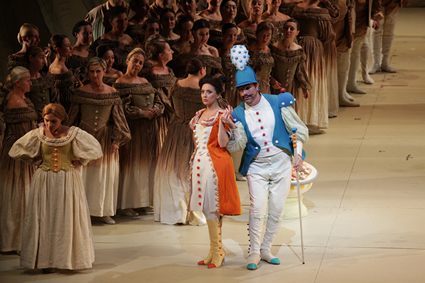| Opera Reviews | 25 April 2024 |
Vittorio Grigolo delights at La Scala despite harassment claimby Silvia Luraghi |
|
| Donizetti: L'elisir d'amore Teatro alla Scala, Milan 4 October 2019 |
|

Rosa Feola (Adina), Massimo Cavalletti (Belcore), Chorus
|
|
|
A revival of the Grischa Asagaroff’s production of Gaetano Donizetti’s L’elisir d’amore opened earlier in September at Milan’s Teatro alla Scala after the summer break. Tenor Vittorio Grigolo joined the cast for the October performances, this being his first appearance after recent allegations of sexual harassment, which brought about cancellation of his engagements with the Royal Opera in Japan. Even though the news from Covent Garden had also broken in Italian news outlets, there was no apparent discussion or hesitation about possibly suspending Grigolo’s engagement in Milan, and the tenor’s presence on stage did not raise any special concern, in spite of inauspicious predictions by several British columnists. In fact, Grigolo enjoyed a warm success, and his rendition of Nemorino’s famous aria "Una furtiva lagrima" was met with enthusiastic applause and requests for an encore, which the tenor gladly granted, ending the aria in a triumph. Grigolo portrayed a shy Nemorino, completely subdued by Rosa Feola’s smart and defiantly smiling Adina. The soprano showcased her light and agile voice, relying on a sound breathing technique that allowed her to produce a variety of colors, perfectly coupled with her theatrical skills. Baritone Massimo Cavalletti was a bold Belcore, and bass-baritone Ambrogio Maestri portrayed Dulcamara as a delightful braggart, winking at the audience when he sang “Son quasi un milanese” (‘I’m like a Milanese’) while trying to sell his magical products. The stage director, supported by set and costume designer Tullio Pericoli, set the action in a fairy tale setting, and highlighted the comic side of the libretto. The painted canvas sets showed a village on a hill surrounded by the woods, with wild boars running around and peasants carrying colorful baskets of fruit, while the trees, conveniently placed on wheels, could move in and out the stage, leaving a larger or smaller space for the village life. Dulcamara’s fabulous carriage contained drawers and cupboards with his various marvels, and, on the two sides, a trumpet player and a dancer in colorful costumes that helped him promote his merchandize. The production, which premiered at La Scala in 1998 (being an adaptation of a 1995 Zurich production), has been revived several times since, including a 2015 performance at Malpensa airport. At that time, Alexander Pereira had recently been appointed general manager and was planning to extend to Milan his experience with operas staged in public places in Zurich. Now his tenure with the company is approaching the end, and the Milanese audience is waiting to learn about the future plans of incoming general manager Dominique Mayer. The orchestra was conducted by Michele Gamba, who appropriately chose lively tempi that combined well with the spirit of the production. At the performance of October 4th (the second performance with Grigolo) the house was full, and the audience reacted enthusiastically to the singers’ performances, applauding at the end of several numbers and with warm cheers for everyone at the end.
|
|
| Text ©
Silvia Luraghi Photo © Teatro alla Scala |
|







